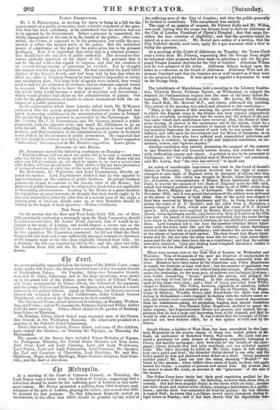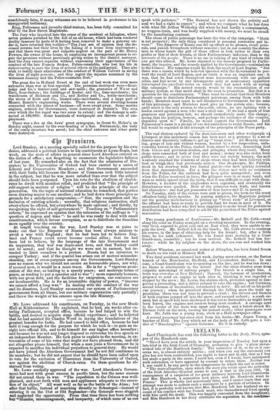tht 3ittrafulio.
At a meeting of the Court of Common Council, on Thursday, the Lord Mayor read a letter from the Bishop of London, suggesting that a collection should be made for the suffering poor of London at this-incle- ment season. Mr. Bower presented a petition from 1600 destitute coal- whippers of the port of London, praying for relief; and moved that 5004 be granted for that purpose. To this Alderman Kennedy moved en amendment, to the effect that 1000/ should be granted for the relief of the suffering poor of the City of London • and that the public generally be invited to contribute. This amendment was carried.
The copy of an opinion of counsel, Sir Fitzroy Kelly and Mr. Willes, was read, stating that the usage has always been to elect an Alderman of the City of London President of Christ's Hospital ; that that usage fur- nishes the true criterion of eligibility ; and that the question might be raised on a quo warrant°. Mr. Bower gave notice of a motion, that the City Solicitor should, next term, apply for a quo warranto with a view to trying the question.
At a meeting of the Court of Aldermen, on Tuesday, the Town-Clerk read a letter from Mr. Fitzroy, requesting that Sir George Grey might be informed what progress has been made in selecting a site for the pro- posed Pauper Lunatic Asylum for the City of London. Alderman Wilson said he was ashamed of the delay. Alderman Sidney looked upon the letter as a reflection on the Court of Aldermen. Alderman Wire and Al- derman Copeland said that the lunatics are as well treated as if they were in the proposed asylum. It was agreed to appoint a deputation to wait on Sir George Grey.
The inhabitants of Marylebone held a meeting in the Literary Institu- tion, Edwards Street, Portman Square, on Wednesday, to support the demand for Parliamentary inquiry into the state of the army before Se- bastopol; Mr. Clement George in the chair. Mr. Lewis, Mr. Nicholay, Mr. Jacob Bell, Mr. Mowatt M.P., and others, addressed the meeting. The assent of the meeting was asked and obtained to this resolution-
" That, in the opinion of this meeting, the great sufferings and disasters to which the English army in the Crimea has been exposed imperatively call for a searching investigation into the causes and the defects of the sys- tem under which such miafortunes have occurred ; that, the House of Com- mons having, in answer to the unanimous call of the nation, voted by a large majority in favour of a committee of inquiry of that House, this meet- ing earnestly deprecates the reversal of such vote by any means, direct or indirect, and calls upon the Government and the House of Commons, as an act of justice to those who have suffered such unparalleled privations and distresses, to institute, by means of a fair and impartial committee, an im- mediate, honest, and vigorous inquiry."
Another resolution was carried, promising the support of the country to any Ministry that will' honestly reform abuses, and conduct the war with unflinching energy and vigour. A petition is also to be presented tei Parliament ; for "the public-spirited men of Marylebone" are convinced, said Mr. Lewis, that "the time has arrived" to speak out.
An action of considerable importance was tried in the Court of Queen's Bench on Wednesday. The question involved was the right of money- changers to take Bank of England notes in disregard of notices that they had been stolen. The action was brought by Messrs. Adam Spielmann and Co., of London, as correspondents of Messrs. Meyer Spielmann and Co., of Paris, to recover the amount of . two Bank of England notes for 5001. each, which had formed portions of notes for the value in all of 30001. stolen from Messrs. Brown, Shipley, and Co., of Liverpool. The notes were stolen in November 1852; and it was proved that notices of the robbery were delivered at the places of business of both firms. One of the,notes was alleged to have been received by Meyer Spielmann and Co., in Paris, from a person giving the name of G. F. Howard ; and the other from A. Monteaux, a money-changer in Paris, which note also had the name of G. F. Howard upon it. Both notes were remitted by Messrs. Meyer Spielmann and Co. to Messrs. Adam Spielmann and Co., and received by them in London on the 27th June last. On behalf of the plaintiff it was contended, that the notes having been taken in the ordinary course of business, he was entitled to recover upon them. Lord Campbell left to the Jury the question whether Meyer Spiel- mann took the notes boha fide and for value; whether Adam Spielmann received them bond fide as a remittance ; and whether the notices were left at the places of business of both parties. The Jury found that Meyer Spiel- mann and Co. did not take the notes bona fide for value ; that Adam Spiel- mann and Co. did take them bond fide as a remittance; and that the notices were duly received. Upon this finding Lord Campbell directed a verdict to be entered for the Bank of England.
There. were serious riots at the East End of London on Wednesday and Thursday. Tens of thousands of the poor are deprived of employment by the severity of the weather, especially in all vocations connected with the river. Measures have been taken by the Guardians and Police Magistrates to supply the destitute at least with „food ; but the number of applicants was so great that the officers could not relieve them fast enough. Mobs collected, under the leadership, for the most part, of stalwart and turbulent Irishmen; who, loudly demanding " bread," paraded the streets, and pillaged the shops, not only of food but of money. In this alarming state of thffigs, most of the shops were shut ; and a kind of terror prevailed from 'White- chapel to Hackney. The Police, however, regardless of numbers, rushed upon the ringleaders and arrested many. All day on Thursday, the Magis- trates in Stepney, Worship Street, 'and Southwark—for there was some rioting in Bermondsey—were engaged in dealing with the fellows under ar- rest, and several were committed for trial. They also received deputations from the inhabitants asking for protection, begging that special constables might be sworn in. The Thames Police Magistrate declined to grant the latter request; but Superintendent Howie was present, and assured the ap- plicants that he had a large and increasing force at his disposal, and that he would be able to maintain order. It was evident that the example of Liver- pool had not been without effect, for it was spoken of with zest by the rioters.
Joseph Cleary, a builder of West Ham, has been committed by the Lam- beth Magistrate on the serious charge of firing two loaded pistols at Mr. Leah, an auctioneer of Beresford Street, Watworth. Mr. Leah had pro- cured a purchaser for some houses at Kingsland, originally belonging to Cleary, but heavily mortgaged ; they were sold for the benefit of the mort- gagee; Cleary thought they had been sacrificed, and was irritated against Leah. The other morning he called on Mr. Leah, began to talk angrily, took out a pistol and fired ; the intended victim shrank to one side, and the bullet passed by him and shattered some dishes on a shelf. Cleary produced another pistol ; Mr. Leah ran into the street, shouting "Murder !" fol- lowed by the assassin ; when within three yards of Leah, he fired, but again missed his victim : a number of persons now seized him. He avowed that he meant to shoot Mr. Leah, on account of the "grievance" of the sale of the houses.
The Police Force have lately had their good reputation penned by the conduct of some of their number. On Saturday, no fewer than three were in custody. One had been stupidly drunk in the street while on duty ; another had been drunk and violent when off duty, creating a disturbance at a public- house ; and the third was committed for trial for perjury : the last offender is named Hall • he swore that a publican served many customers during il- legal hours on Sunday; and it has been shown that his depositions were
scandalously false, if many witnesses are to be believed in preference to his unsupported testimony.
King, Policeman and juvenile thief-trainer, has-been fully committed for trial by the Bow Street Magistrate.
The Jury who inquired into the cause of the accident at Islington, where seven persons perished by the full of an old house, which had been rendered doubly insecure by parts of it having been removed to make a gateway un- der it, have returned this verdict—" The Jury are of opinion that the de- ceased persons lost their lives by the falling of a house from inadventure ; and that there was great and culpable neglect on the part of Mr. Henry Fownes, the owner of the house, in employing an incompetent person to re- pair the premises without previously giving notice to the district surveyor. And the Jury cannot separate without expressing their approbation of the conduct of the late Francis Stoker, Police-constable, who lost his life in endeavouring to save the lives of several others at the said period. They also wish to testify their admiration of the conduct of William Calvert in saving the lives of eight persons ; and they regret the injuries sustained by the witnesses Jauncey and the Police-constable Best."
The great fire in Holland Street at the end of last week was even more extensive than was at first reported. The premises destroyed were—Rout- ledge and Co.'s timber-yard and saw-mills ; the granaries of Wader and Steel, flour-factors ; the buildings of Basher and Co., lime-merchants; the warehouses of Rickman and Co., and Hadley and Co., bottle-merchants ; the stores of Scott and Co., linseed-cake-merchants; and a large part of Messrs. Rennie's engineering works. There were several dwelling-houses connected with the places of business—all were swept away. Some marine engines, ordered for Government, were destroyed at Rennie's. The area over which the fire raged was two acres in extent ; and the damage is esti- mated at 180,000/. Some hundreds of workpeople are thrown out of em- ployment.
There was a fire at the Jews' great synagogue, in Great St. Helen's, on Sunday night, caused by the over-heating of a flue. Fortunately, the body of the costly structure was saved; but the chief entrance and other parts were destroyed.



































 Previous page
Previous page